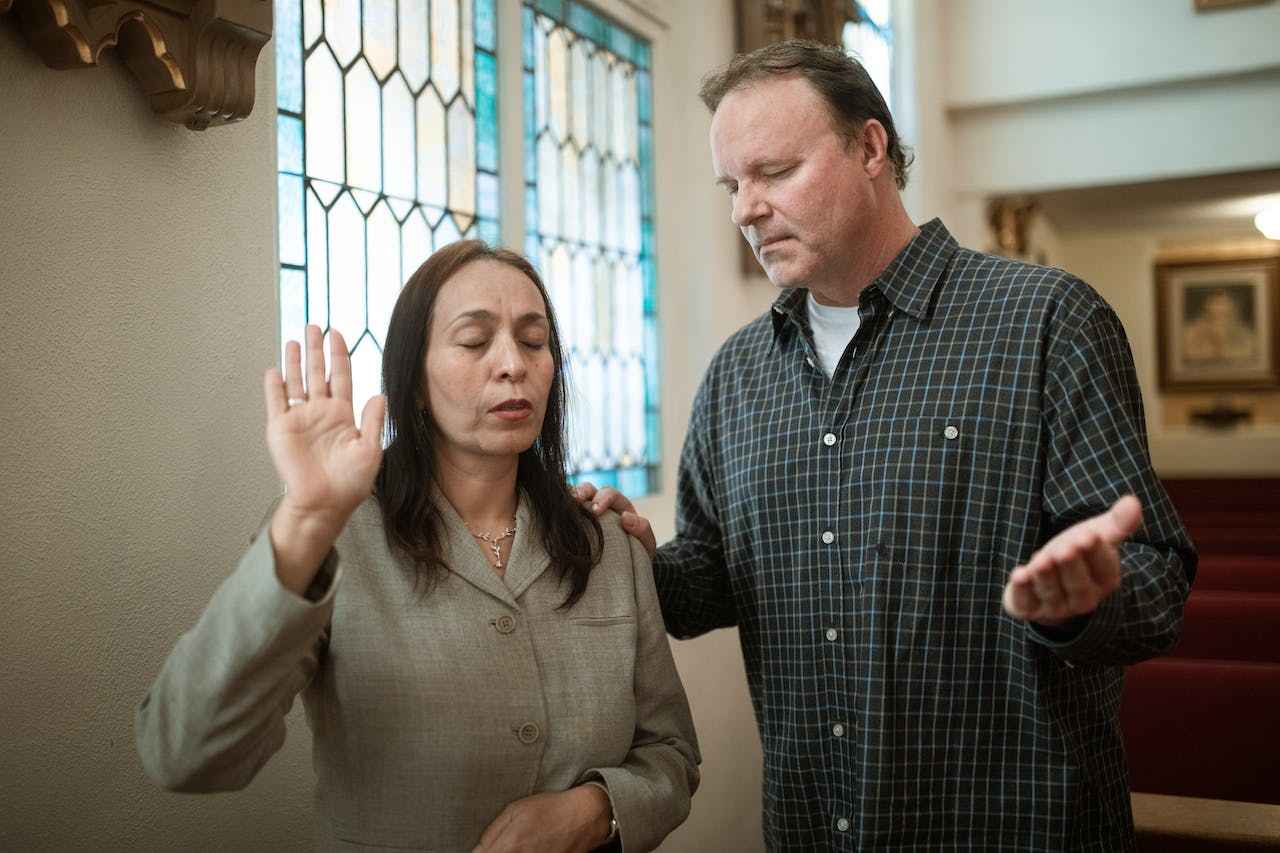Forgiveness is a central theme throughout the Bible. But have you ever wondered exactly how many times the Bible discusses forgiveness?
In this article, we’ll explore how often forgiveness is mentioned in the Bible, look at some key Bible verses about forgiveness, and discuss the significance of forgiveness in Christian teachings.
And you’ll learn just how significant forgiveness is in living out Jesus’ teachings.
Let’s dig in and find out…
Counting the Mentions of Forgiveness
The exact number of times that forgiveness is mentioned in the Bible depends on the translation. Here is how forgiveness is mentioned across some major English Bible translations:
- In the King James Version (KJV), some form of “forgive” is used 139 times.
- The New International Version (NIV) uses “forgive” 156 times.
- The New King James Version (NKJV) mentions forgiveness 145 times.
- The English Standard Version (ESV) includes “forgive” 143 times.
So we see the word “forgive” or some conjugation of it appears well over 100 times, ranging from 139 to 156 mentions depending on the translation.
While these statistics give us a good idea of how often forgiveness is directly discussed, it does not capture the many stories and passages about forgiveness that do not directly use the word “forgive.” So the theme of forgiveness permeates scripture even more thoroughly than these numbers indicate.
Also Read: Which Bible Translation Is Closest to the Original Translation?
Key Bible Verses About Forgiveness
Here are some of the most significant Bible verses that discuss forgiveness:
“For if you forgive other people when they sin against you, your heavenly Father will also forgive you.” (Matthew 6:14) – In the Lord’s Prayer, Jesus emphasizes the connection between receiving forgiveness from God and extending it to others.
“Bear with each other and forgive one another if any of you has a grievance against someone. Forgive as the Lord forgave you.” (Colossians 3:13) – Christians are instructed to forgive others in the same way Christ forgave us.
“And when you stand praying, if you hold anything against anyone, forgive them, so that your Father in heaven may forgive you your sins.” (Mark 11:25) – Again, Jesus links human forgiveness of others to receiving divine forgiveness.
“Be kind and compassionate to one another, forgiving each other, just as in Christ God forgave you.” (Ephesians 4:32) – We are to forgive because we have been forgiven by Christ.
Forgiveness in Jesus’ Parables
Some of Jesus’ most famous parables deal with the theme of forgiveness and provide insight into why it is so important:
The Parable of the Unmerciful Servant (Matthew 18:21-35) – A servant is forgiven a large debt by his master, yet refuses to forgive a smaller debt owed to him, illustrating the hypocrisy of accepting forgiveness yet being unwilling to forgive others.
The Prodigal Son (Luke 15:11-32) – The compassionate father in the story represents God, eager to forgive the repentant son who squandered his inheritance but returns home.
The Good Samaritan (Luke 10:25-37) – The hated Samaritan overlooks ethnic prejudice and cares for an injured Jewish man, exemplifying unexpected mercy.
The Significance of Forgiveness in Christianity
Forgiveness is essential to Christianity for several reasons:
God’s forgiveness enables our redemption – Without Christ’s forgiving sacrifice on the cross, salvation would be impossible. God’s forgiveness allows us to be reconciled to Him.
Forgiveness brings healing – Harboring resentment and anger hurts us mentally and physically. Forgiveness frees us from bitterness.
Forgiveness expresses grace – When we forgive others, we reflect God’s grace and love. It is an act of mercy that builds relationships.
Forgiveness is commanded by Christ – Jesus instructed his followers to forgive unconditionally. It is foundational to living as Christians.
The abundant scriptural mentions of forgiveness reflect how central it is to the gospel. As author Philip Yancey writes, “The Bible stands or falls on the reality of forgiveness. It has no meaning or message without that central theme.” (What’s So Amazing About Grace?)
Challenges and Effects of Forgiveness
Despite its importance, practicing forgiveness can be very difficult:
- It goes against our natural instincts for justice and revenge.
- We may feel the transgression is unforgiveable or still hurts too much.
- We often desire to see remorse and repentance from the offender first.
However, studies show that cultivating forgiveness, even in extreme circumstances, can lead to:
- Decreased stress, anxiety, and hostility
- Lower risk of depression and improved wellbeing
- Stronger relationships and social connection
- An increased ability to empathize with others
Forgiveness is often more for our own benefit than the offender’s. As Martin Luther King Jr. wrote, “Forgiveness is not an occasional act; it is a permanent attitude.”
Distinguishing Between Forgiveness and Reconciliation
Forgiveness ≠ Reconciliation
Forgiveness does not automatically lead to reconciliation.
We can forgive without restoring the relationship or removing consequences.
Letting Go of Bitterness
Forgiveness means releasing bitterness and the desire for revenge.
But it does not necessarily rebuild trust.
Trust may need to be re-earned over time. Or it may never fully come back.
Healthy Boundaries After Forgiveness
After offering forgiveness, thoughtfully consider what healthy boundaries look like moving forward.
The relationship may not go back to how it was before.
Words of Wisdom on Forgiveness
Here are some insightful quotes on the nature and importance of forgiveness:
“To forgive is to set a prisoner free and discover that the prisoner was you.”
“Forgiveness says you are given another chance to make a new beginning.”
“Anger makes you smaller, while forgiveness forces you to grow beyond what you were.”
Forgiveness is a frequent topic in scripture because of how essential it is to Christianity. Despite the difficulties, cultivating a forgiving heart offers immense benefits, both spiritual and psychological. It is a challenging but necessary step in our walk with God.
The Power of Forgiveness in Healing and Restoration
We have already explored how often forgiveness is discussed in the Bible and some of the most significant verses about forgiveness. Now let’s take a deeper look at how the Bible depicts forgiveness leading to healing, restoration, and strengthened relationships.
Forgiveness as a Path to Healing
Both physical and emotional healing are often linked in the Bible to forgiving others and receiving forgiveness ourselves. Here are some examples:
- The Paralyzed Man Healed by Jesus (Matthew 9:2-7) – Jesus first forgives the paralyzed man’s sins before healing his physical ailment, implying a connection between forgiveness and healing.
- The Sinful Woman Forgiven (Luke 7:36-50) – Jesus forgives the weeping woman despite objections from the Pharisees. His mercy released her from shame and suffering.
- Job’s Fortunes Restored After He Forgives His Friends (Job 42:10-17) – Only after Job prays for his foolish friends does God restore his wealth and health.
Forgiveness can start our healing process when we have been hurt. It allows us to let go of corrosive anger and resentment. Studies show people who forgive have better mental health outcomes, including less anxiety, stress, and hostility.
Forgiveness Restores Relationships
Throughout scripture, extending and receiving forgiveness leads to reconciled relationships. Joseph forgave the brothers who betrayed him, and the prodigal son was welcomed back by his forgiving father.
Even when full reconciliation does not seem wise or possible, forgiveness can still restore a relationship to civility and decrease animosity.
Also Read: How Many Times Is the Holy Spirit Mentioned in the Bible?
Biblical Examples of Forgiveness Promoting Reconciliation
- Esau Forgives Jacob (Genesis 33) – Jacob betrayed Esau, but Esau embraces Jacob when he returns, letting go of bitterness.
- Joseph Forgives His Brothers (Genesis 45) – Joseph reveals his identity to the brothers who sold him into slavery and tells them not to be distressed.
- Jesus Reconciles with Peter (John 21:15-19) – Peter previously denied Jesus, but Jesus forgives and restores him to fellowship.
Why is Forgiveness Important in Relationships?
Forgiveness allows relationships to be sustained despite inevitable hurts and conflicts. Without forgiveness:
- Resentment and anger accumulate, poisoning relationships.
- We become isolated as we cut off those who have offended us.
- Our perspective becomes skewed when we cannot let go of wounds.
- We miss out on the joy of reconciliations and fresh starts.
In marriage, friendships, work partnerships, and family relationships, forgiveness provides the salve that allows bonds to be healed and strengthened. It reflects the true meaning of love, which “keeps no record of wrongs” (1 Corinthians 13:5).
How God’s Forgiveness Transforms Us
No discussion of forgiveness would be complete without examining how God’s merciful forgiveness changes us. We are able to forgive because we have been forgiven.
The Transforming Power of God’s Forgiveness
Being radically forgiven by God should prompt us to:
- Forgive others in return, since we have been forgiven much more.
- Repent from prideful judgmentalism, recognizing our own faults.
- Extend grace, knowing we did not deserve grace.
- Embrace humility, remembering we were undeserving recipients of mercy.
As 1 John 1:9 says, “If we confess our sins, he is faithful and just and will forgive us our sins and purify us from all unrighteousness.” God’s forgiveness cleanses and transforms our hearts.
Examples of Transformed Hearts
The Bible recounts many examples of people who were deeply changed after being forgiven by God:
- The Woman at the Well (John 4) – After Jesus knows her sins but talks openly with her, she becomes an evangelist sharing the gospel.
- Zacchaeus the Tax Collector (Luke 19:1-10) – His encounter with the forgiving Jesus prompts Zacchaeus to repent from corruption and make amends.
- Peter After Denying Jesus (John 21:15-19) – Jesus restores Peter, who goes on to become a courageous church leader.
The Paradox of Forgiveness
G.K. Chesterton noted the paradox that “Forgiveness redeems the unforgivable.” God’s wisdom is that mercy and justice meet perfectly in the cross. Forgiving like God does not minimize the seriousness of wrongs. Rather, it reflects the depth of love and compassion that exists beyond our human understanding. We must walk in humility, wise enough to forgive while avoiding cheap grace.
Practicing Forgiveness in Everyday Life
The Bible provides ample instruction on the importance of forgiveness. But what does extending forgiveness look like in real life? Here are some ways we can apply the biblical principles of forgiveness in our everyday relationships and situations:
Forgiving Family Members
- Family relationships can often be the most complex. Try to see your family member’s position and why the offense may have happened.
- Reflect on times you were forgiven by family and extend the same grace.
- Releasing bitterness can help heal generational family dynamics and pain.
- Forgiveness does not necessarily mean trusting toxic behavior. Set healthy boundaries if needed.
Offering Forgiveness at Work
- workplace offenses like gossip, belittling comments, stolen credit, or passive aggression can quickly breed resentment. Offering forgiveness preserves team unity.
- Consider the motivations behind the offense. Insecurity, thoughtlessness, or too much pressure can cause people to act out.
- Forgiveness does not mean allowing abuse or discrimination. Have candid conversations to seek positive change.
Forgiving Friends
- Friendships periodically have misunderstandings and unintended hurts. Forgiveness and honesty help friends reconcile.
- Reflect on times your friends forgave you. All relationships are two-way streets.
- Assess whethertoxic friends need to make amends before trust is rebuilt.
Forgiving a Partner
- No marriage or committed relationshipwill be free from hurts. Forgiveness will bind you closer together.
- Remember the reasons you fell in love. See the whole person, not just the hurtful act.
- Serious breaches like emotional or physical abuse require professional help and may impact the viability of the relationship.
- Move forward in hope, not naivety. Establish relationship safeguards and expect changed behavior.
Forgiving Ourselves
- Accepting God’s forgiveness can free us from shame and self-condemnation.
- Reflect on lessons learned and allow your mistakes to make you wiser and more empathetic.
- Consider making amends if your mistakes harmed others.
- Focus on growing into who God designed you to be without lingering guilt.
In all our relationships, forgiveness paves the way to healing, frees us from bitterness, and makes love possible. May we extend grace freely, even when it is hard.
Choosing Forgiveness
Since forgiveness goes against our natural instincts, it involves an intentional choice motivated by faith and obedience.
We will never feel like forgiving in our own strength. We must cry out to God for the grace to forgive.
It may begin simply as a decision of the will, not an emotion. We choose to release the anger and desire for revenge.
Forgiveness may need to be re-chosen again and again as feelings of pain resurface. But it gets easier with time and distance.
Praying for our offender can soften our heart and turn them from an enemy to someone in need of God’s touch.
We forgive without excuses or exceptions, even if the offender is unrepentant. We do it for our sake, not theirs.
Forgiveness is an act of faith, believing that God is the true judge and that only He can bring meaningful justice in His time. It is an act of obedience, doing as Jesus commanded us and following His example. And it is an act of freedom, choosing to break free from the chains of resentment that would otherwise ensnare our hearts.
The transformational power of forgiveness is depicted throughout the pages of the Bible. As Matthew 6:14 says, “For if you forgive other people when they sin against you, your heavenly Father will also forgive you.” May we live today embracing the freedom of forgiveness.



















